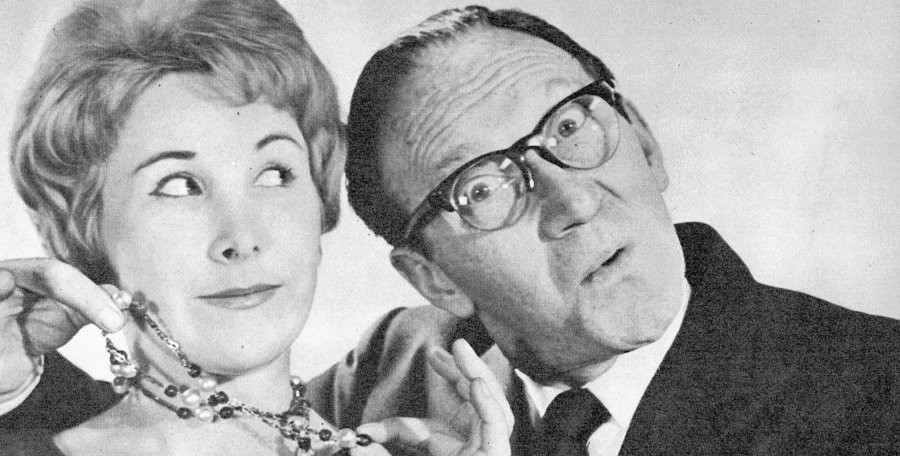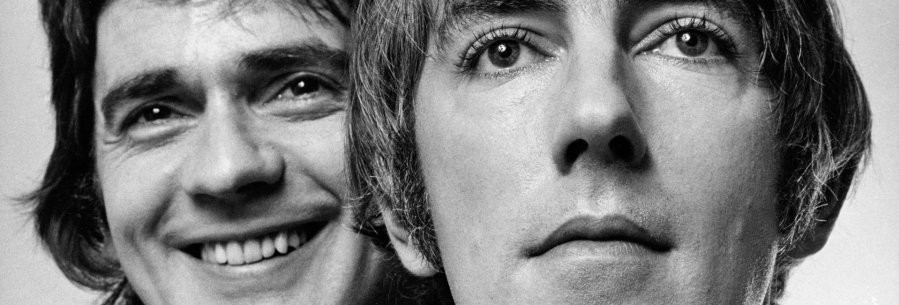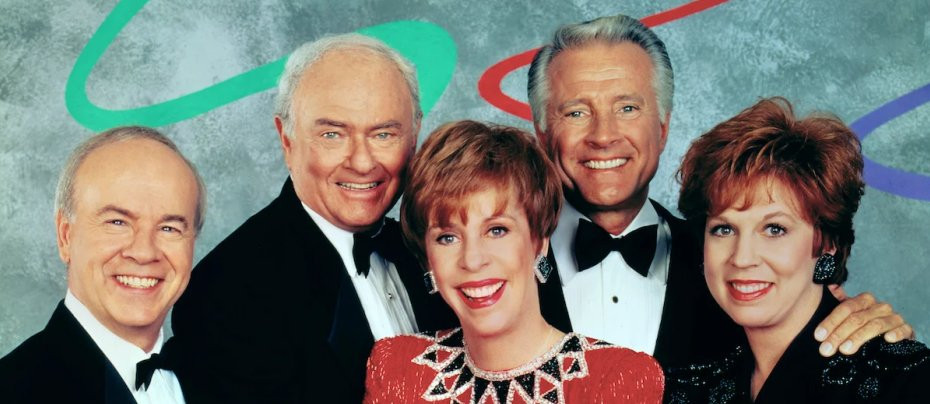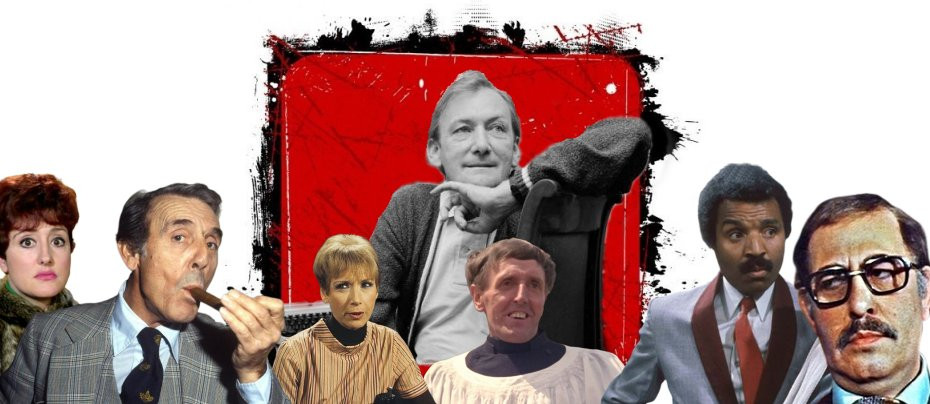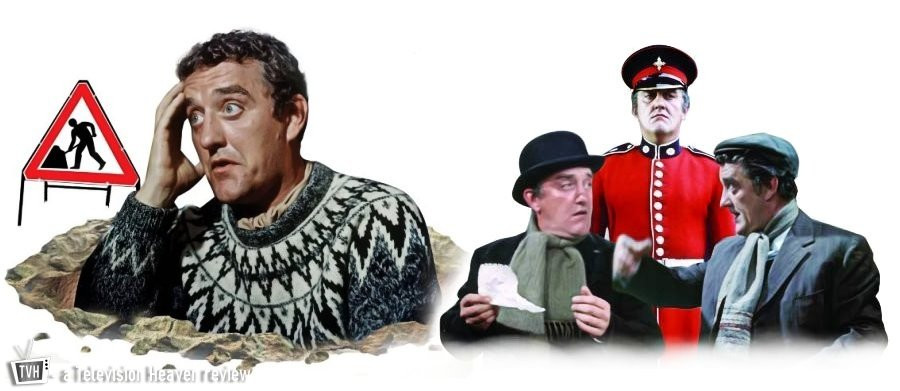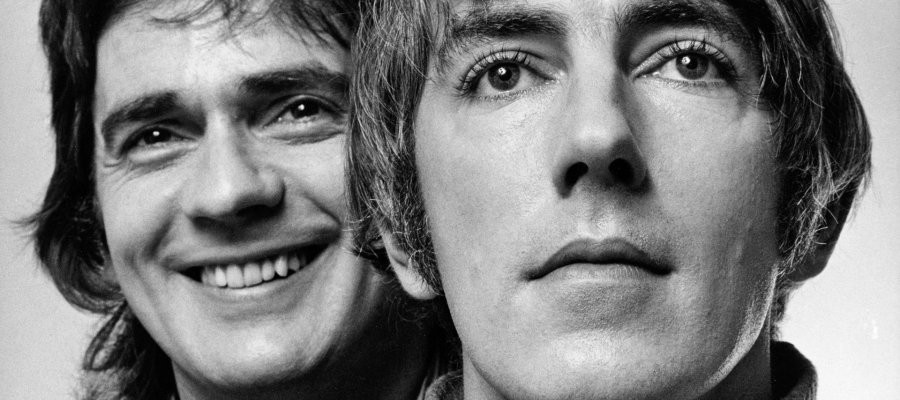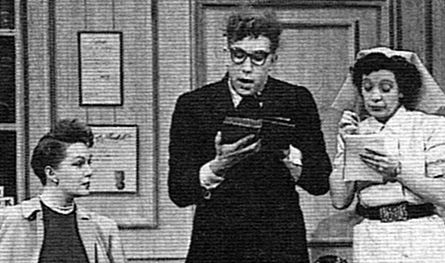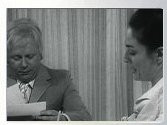
Clever Dick - Dick Emery's Comic Creations
Dick Emery's characters were some of the best remembered on British television for a number of years and among his comedic creations were the breath-catching First World War veteran, Lampwick; the old codger who would connive to get his own way and cause trouble between his daughter and son-in-law - Hettie; the frustrated spinster - the toothy Vicar. The 'bovver boy'; Gaylord. The effeminate swinger who referred to everyone as 'Honky Tonk' - the upper-class tramp; College - the bike riding Ton Up Boy - and most famously Mandy; the brassy blonde who always misunderstood the street interviewer (a feature that opened the show until 1975), and interpreted his question to have a suggestive meaning so that it would lead her to slap him on the shoulder as she announced, "Ooh, you are awful - but I like you!" It became a national catchphrase and was so popular that it also became the title of Emery's full-length feature film in 1972.
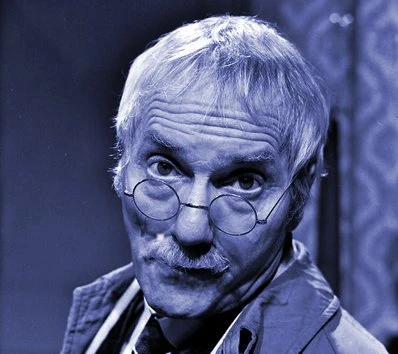
In creating these characters Emery utilised his natural flair for mimicry, picking up on the idiosyncrasies of people he'd met, his ear for dialogue and his observation of mannerisms combining to create characters who were funny, and yet believable and identifiable. In 1973, at the height of his popularity Emery wrote 'Dick Emery in Character' a book which explained how he'd formed some of these memorable creations.
Below are the best of his comic characters with excerpts from ‘In Character’ where Emery explains the inspiration behind their creation.
The Ton-Up Boy
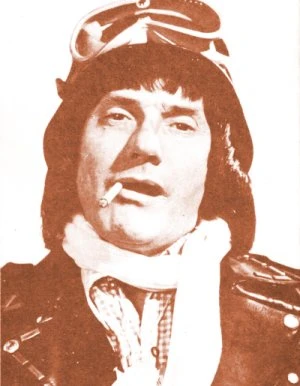
Ton-Up Boys were motorcyclists whose very title suggested speed; 'doing a ton' being slang for driving at breakneck speeds. The Ton-Up boy usually dressed in leather and became popular before the term 'swinging sixties' was even thought of. They often frequented tea stalls, coffee bars, and cafes of the time. They were often perceived as tough or 'bully boys' by those outside of their circle. In fact, Dick Emery was a keen motorcyclist and owned several large bikes himself. The bikes his Ton-Up Boy was seen riding in the TV series were his own.
He wrote of the character: "He needs little in the way of make-up, except for a thick wig. In addition to his basic motor cycling gear, his jacket is adorned with chains and badges, and he wears a military helmet. I have never intended to ridicule motor cycling enthusiasts through this character or make him the butt of our fun. The Ton-Up Boy has been a member of my television family from the earliest series. He is happy-go-lucky, full of the kind of jokes he might have picked up at his group's last gathering, and above all dedicated to his bike."
The Traffic Warden
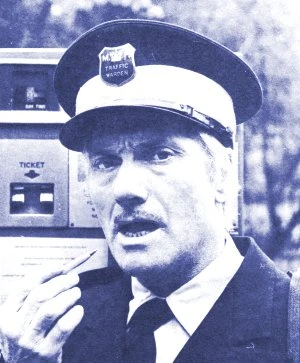
The Traffic Warden represented the small man who, once given a uniform and a little authority, viewed the rest of society as nothing more than doormats to wipe their feet on. But Emery was quick to point out that his portrayal of this character was not specifically aimed at wardens themselves and was merely a convenient comic character used to represent anyone in authority: "My Traffic Warden is the product of many years watching and disliking such characters. He is the vicious bullying type who never knows when to turn a judicious 'blind eye'. Theirs is a hard job, there is no doubt, and they are on the receiving end of much blame and abuse. Their reputation for pettiness probably stems from a mixture of the motorist’s frustration at not being able to find a parking space, and the attitude of those wardens who patrol the streets like mine does, dedicated to the downfall of the motorist at all costs."
The props for the Traffic Warden were a satchel, notepad and pencil and of course the uniform which was standard issue at that time. A mean regimented moustache was added in makeup and Emery jutted out his lower jaw as if to challenge the motorist's right to park-or even own-his car!
Hettie
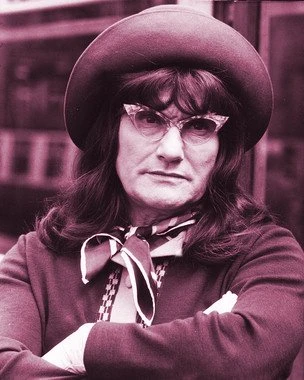
Hettie was the frustrated spinster who was forever on the lookout for a man. Whenever she was approached by the interviewer in the street with an 'excuse me, madam' she would waste no time in telling him that she was in fact a 'miss', alerting him, and the rest of the world, to the fact that she was available. And Hettie would go to any lengths to find a man, although it was plainly obvious that none of her schemes had proved successful: "Hettie, though ridiculous, is also a pathetic character. I try to bring out this side of her through movement and posture. When she is approached by the interviewer, Hettie becomes a very tense little woman, suddenly aware that she is the centre of attention. Such is her total preoccupation with finding a man that she reduces everything to terms of her own obsession."
For a long time, Hettie was simply described in scripts as 'Frustrated Spinster' in order to hide the fact that she was actually based on a woman that Dick Emery worked with. Not only did he take on the whole look of this woman, he even took her name!
Interviewer: Excuse me, madam.
Hettie: Miss!
Interviewer: Miss. May I ask; do you think one should help one's neighbours?
Hettie: Oh yes. I live next door to the rugby club. Their dressing room burnt down last month so I let all those big beastly men use my bedroom to change in.
Interviewer: That's very kind of you. I expect you'll miss them once their changing room has been rebuilt.
Hettie: Not for long. I'm going to burn it down again!
The Bovver Boy
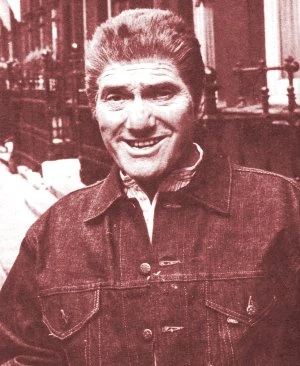
The 'Bovver Boys', also referred to as 'skinheads' grabbed media attention in the UK through the 1970s mostly as a result of hooliganism during football matches. Their style of dress mainly consisted of fitted Ben Sherman or Fred Perry sports shirts, straight leg denims either cut short or turned up to reveal their boots which were made by Dr Martens (also referred to as Doc Martens or DMs). Their hair, as the term 'skinhead' suggests, was close cropped with no greater than a number 2 guard. Dick Emery's character was actually an updated version of an earlier young juvenile delinquent, the Teddy Boy, and was created during the 'Grand Prix' special.
Originally, he was intended to be an experiment in a type of 'candid camera' sequence where Emery, in character wandered around a Cambridge market. Unfortunately, technical difficulties meant filming had to be abandoned and the sequence never got to the screen. While Emery used the character for comedic effect he made it quite clear that he had little sympathy for the fellow: "The only way he and his kind can draw themselves the attention they crave in the face of indifference and rejection is to resort to a group identity and commit petty acts of senseless violence. And the press and media play a major part in encouraging them by satisfying the desire to be noticed and reporting the extent of the damage and trouble caused. At last, the Bovver Boys have produced a reaction from an otherwise preoccupied society."
Interviewer: Excuse me, sir.
Bovver Boy: Yer?
Interviewer: Is there anything in life that you feel you've missed?
Bovver Boy: Yer. I never learnt to drive.
Interviewer: That's no great handicap, not being able to drive.
Bovver Boy: It is when you're a car thief.
Clarence
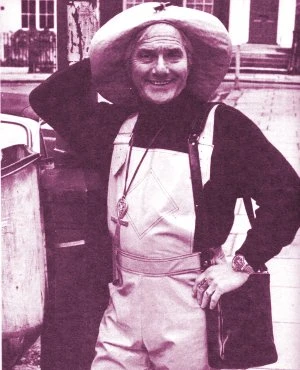
Clarence, also known as 'Honky Tonks', had actually been in Dick Emery's act for many years in one guise or another although he admitted that it was the one character that had undergone the biggest change. When Clarence began life, homosexuality was only hinted in terms of comedy rather than bought straight out into the open. In the main these characters were more familiar to cabaret than TV. Emery stated that adopting a camp attitude was a useful ploy when faced with an unresponsive audience staring across their plate of steak and chips blankly at a performer. "Why the suggestion of homosexuality should be funny is imponderable - perhaps our laughter is defence, a reaction against hidden fears about our innermost tendencies", he contemplated. By the 1970s gay characters appeared more openly although they were portrayed as farcical and camp and created purely for comic relief.
At the same time as Clarence became a staple of Emery's repertoire, John Inman was starring on television as Grace Brothers decidedly effeminate (but undeclared homosexual) menswear salesman Mr Humphrey’s in 'Are You Being Served?', and Larry Grayson was making a name for himself camping it up as the comedian with a decidedly gay persona which actually formed the mainstay of his act. Prior to the 1970s Clarence had appeared with heavy make-up; he also wore a wig of short, blond, swept-back hair. However, in the early part of the decade men began to wear brighter and more adventurous clothes and Clarence soon found that he was being outdone. So out went the old props and in came a more fashion-conscious character complete with outrageous outfits, accessories and a far more effeminate manner. Clarence was probably the template for ‘Little Britain’s’ Daffyd and one imagines that Matt Lucas has taken the character and shown us his modern-day version. In the early 1970s, Clarence was the only gay in the village.
The Sporting Gent
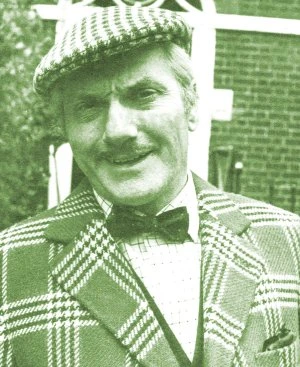
The Sporting Gent was anything but sporting. Here was a man who you would avoid at all costs because the only one he ever looked out for was number one. He would sell his own mother if the price was right and was described as Emery as a ‘genuine British cad.’ He was based on a character Emery had met on the beaches of Normandy, a few days after D-Day. "We had been posted [there] to entertain the troops and keep up morale. When we landed, shaky and glad to be on terra firma again, this chap-a real RAF type-came up and asked with concern where the girls were. To be asking about girls, when as we spoke, we could hear Caen being bombed to pieces! When we told him that we played the girls roles as well, he gave that ‘Ha ha ha’ which has become the Sporting Gent’s familiar guffaw."
Emery thought that while full of comedic possibilities, the Sporting Gent was a thoroughly reprehensible character: "He is identified by his loudly checked jacket, jaunty bow-tie, flat cap and thin, well-trimmed moustache, and is usually found in bars, drinking shorts-which he never buys himself if he can help it. I like to think he is the outcast of a well-to-do family. The kind of tweeds his father wore have been replaced with a louder pattern in accordance with his flashy taste. To compensate for his loss of station, the Sporting Gent has to overstate everything. Keeping up appearances is important to us all; to this man they have to compensate for everything else. He is interested in your wallet, possibly your wife, but definitely not you-unless it’s your round that is."
Interviewer: Pardon me, sir.
The Sporting Gent: Yes, old boy?
Interviewer: Do you believe in being a good neighbour?
The Sporting Gent: I most certainly do, old chap. Take the other evening-my neighbour's little pussy got stuck up on the roof. I climbed up to get it down and fell through straight into the au pair's bed.
Interviewer: That's unbelievable!
The Sporting Gent: That's exactly what the wife's solicitor said.
College
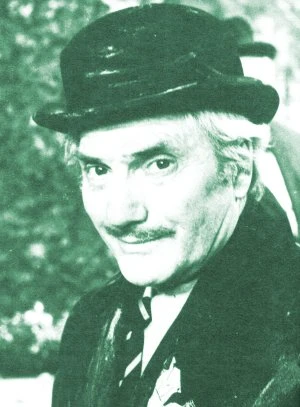
Dick Emery on College: "His very name suggests that he has had some kind of education, and he seems to have enjoyed a rather different background from the usual down-and-out tramp. The humour of the situation comes from the difference between College's actual status in life, and his refusal to acknowledge his reduced circumstances. He remains a gentleman with cultural pretensions while slumming it with his friend, Droopy. He retains the vestiges of his former life. with his old school tie, battered bowler hat and crumpled buttonhole. And if he met a fellow 'old boy' from his school taking a stroll through the park where College sleeps every night, he would act as though their stations in life were equal, and his misfortunes would become even less real to him."
There is no doubt that the tramp has always been a favourite character of viewers, but this character has always had a strong appeal for comedians as well due to the scope of comedic situations and characterization. Since the days of silent comedies when Charlie Chaplin donned a bowler hat and picked up a walking stick the tramp has always held a special place in the affections of viewers and critics alike. One critic, James Agee, wrote of Chaplin's character: '[He] is as centrally representative of humanity, as many-sided and as mysterious, as Hamlet, and it seems unlikely that any dancer or actor can ever have excelled him in eloquence, variety or poignancy of motion.'
In the 1960s comedian Arthur Haynes enjoyed success with his own tramp character. Both had one common factor; the characters forever railing against society and the triumph (no matter how short lived) of the little man against officialdom.
The Vicar
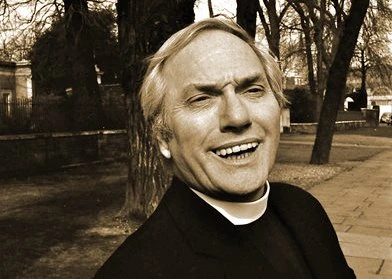
Dick Emery's vicar reflected his own personal impression of the standard TV clergyman. And he found that character insincere. He was also quick to rule out any impression he might give of deriding the Christian faith in his characterization of The Vicar stating that it was only the TV version that he was suspicious of: "To me, they are a breed apart, totally divorced from reality. I have watched them intoning the same old pious platitudes in late-night discussion programmes, Sunday religious broadcasts and nightly epilogues, in voices which must surely be reserved for their TV appearances." It's true that many character actors, when imitating the clergy for comedic effect would adopt the most patronizing of voices. It wasn't until the 1990s and the arrival of Dawn French's joke-cracking, irreverent reverend Geraldine Granger that viewers got a chance to look at the clergy in a different and more positive light, bringing the character more into line with modern thinking.
It was probably the best publicity the church had had in a long time. But Emery's character was steeped in the old attitudes and formed by his own impressions of what he'd seen: "The Vicar reflects my impression of the insincerity of the standard TV clergyman. He has the same pious voice and expression, which in his case mask a very disreputable character." For this characterization Emery wore a set of protruding front upper teeth. This immediately made The Vicar a comedic character. "I think to," he wrote "that they help him to achieve that sanctimonious, butter-wouldn't-melt-in-my-mouth look. For instance, having inadvertently disclosed his true nature while answering the interviewer's questions, he has to compose his features around these teeth in order to resume the usual expression of bland piety which he presents to the world."
Interviewer: Excuse me, Vicar.
Vicar: Yes, my son?
Interviewer: As a man of the Church, I am sure you have the interests of the community very much at heart.
Vicar: Oh, yes indeed. For instance, on behalf of my flock I have been keeping a critical eye on some of the scandalous strip clubs in the neighbourhood.
Interviewer: And what are your conclusions?
Vicar: Well. for my money you can't whack Miss Lulu and her trained python at the Girlies Galore.
Mandy
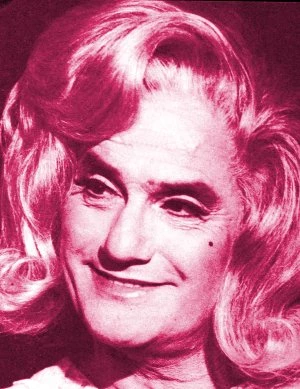
Probably Dick Emery's best-known character and the one with the most familiar catchphrase, Mandy was a busty blond who was forever misunderstanding the interviewers questions so that she always assumed it had a suggestive, sexual connotation. Her reaction would be to deliver the obligatory punchline "Ooh, you are awful, but I like you" which was delivered with a slightly less than playful punch to the interviewer’s shoulder. She was a viewers’ favourite. Dick Emery hated her: "I have no great love for the female characters I portray. I never present a 'nice' woman, perhaps because deep inside I resent the suggestion that I am a female impersonator. And of all my characters, Mandy is the least real. However, it is seldom that she does not encroach upon my own life, for all her unreality-she is rather difficult to live with, because wherever I go, someone is always ready with her punchline."
The character was actually invented on an improvised stage on the back of a lorry in Normandy during the war. At that time, she didn't have a name, and in fact wouldn't have one for many years until she was finally named after a notorious prostitute who was the centre of one of Britain's biggest sex scandals in the early sixties: Mandy Rice-Davies. Emery was always amazed at the popularity of the character: "Despite my own feelings about the unreality of Mandy, she seems to have achieved an identity of her own."
Emery expressed his wish to drop Mandy from his shows, but he never did. "I once dislocated the poor interviewer’s arm with a rather too vigorous punch! It just goes to show how dangerous it is to tangle with blondes!"
Interviewer: Now here comes a charming young lady.
Mandy: Hello
Interviewer: Tell me, are you impressed by aristocratic titles?
Mandy: Oh, no. I speak my mind, no matter who I'm talking to.
Interviewer: I see, you mean you wouldn't let anyone take advantage of you?
Mandy: Pardon?
Interviewer: I mean, you wouldn't take things lying down, even from a duke?
Mandy: Ooh, you are awful...but I like you!
Published on November 27th, 2019. Written by Laurence Marcus with excerpts from 'Dick Emery in Character' for Television Heaven.


